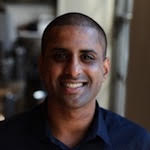Over the next several months, The Advance Initiative will be sharing the stories of Indian Americans who are serving the Lord within the local church in cities all across the U.S. Their backgrounds, experiences, and roles may differ, but their desire is the same – to make much of Jesus through the planting of gospel-centered, multiethnic churches. Our hope is that these stories would encourage you, inform you, and lead you to give glory to God for what He is doing in our generation.
This week, meet Jason James, Church Planting Intern at Grace, NYC.
Tell us a little about yourself.
I grew up in Oklahoma City, OK. As a nominal Christian for most of those years, I actively participated in Sunday services, but never quite knew what to make of Jesus. Moral failure and familial turmoil convinced me that being a part of a church was a fleeting endeavor, and I essentially gave up on all things God.
In December of 1999, in a season of desperation, I cried out to the Lord to change me. Over the next several years, God opened my eyes to see what He had done for me in Jesus. He used the good news of the Gospel to awaken my heart. I am currently living in Harlem, NY with my wife Jyothi; and we are expecting a child later this year! Whether in good times or difficult times, life continues to be an unveiling of His love for us.
Describe the story of your journey towards church-ministry.
Since being found by Jesus, I have been involved in several forms of ministry – itinerancy, music, parachurch ministries, campus ministry, short and long term “missions.” However, while all of it has its place and is certainly needed, I realized while working for a church in Houston that there is nothing like the power of the local church. There is nothing like the power of a community of believers who are transformed by the Gospel, empowered by God’s Spirit, loving God, loving one another, and loving their city. As one of my favorite authors, Zack Eswine, says, “To make a global difference means that every local place – whether it is Brooklyn, Vegas, Henryville, or Webster Groves – needs attention. Locality is the way a global difference is made.” It was challenging words like this, and a journey in Houston, that helped me see that if the world was going to know God’s love, it would require the birth of local communities that would persistently and passionately love God and their city.
What are some of the challenges you faced in doing church ministry?
One major challenge in church ministry is the way we think of discipleship. Although we see its importance, we tend to create models that serve efficiency. Since we often equate growth with the acquisition of knowledge, the sum total of our discipleship efforts is reduced to reading a book and discussing it, or attending a weekly service. Highly relational discipleship is missing in many churches – the kind of discipleship where an apprentice is invited into a person’s life to observe and watch firsthand how the Gospel shapes that person’s entire life – how she prays, how she confesses sin, how she is a wife, mother, sister, daughter, student, coworker, and neighbor. But this requires an enormous amount of time and is often very messy, since we are rarely at our best! But if we are going to live reproducible lives, leaders and communities of believers must be willing to sacrifice time and efficiency to teach well, create frequent spaces for others to see that word made flesh in our lives, and join us in living it out.
What unique advantages and struggles did you face as an Indian American doing church-ministry?
Indian American leaders have an incredible challenge and advantage. The challenge for those in Indian churches is that they are at the frontlines of not only reconciling the cultures of being Indian and American, but also inviting other ethnicities that are not used to being a minority among Indians into the community. However, this is also an advantage since it forces leaders to wrestle with the reality of multicultural ministry of being both Indian and American, act prayerfully, and think strategically.
What advice do you have for Indian Americans who are wrestling with the decision to plant a church or to serve at a church plant?
Pray, seek counsel, ask God to give you a love for your city, and be patient. You may not appreciate it now, but rejoice that you serve a God who is more concerned about growing you than you are about growing a church plant.
How can we pray for you?
Pray for my wife and the baby. Pray that we would have wisdom to raise the child in the way God wants the child to go. Pray for our hearts to constantly be in wonder of God and His love for us. Pray for us to be a blessing to Harlem.





